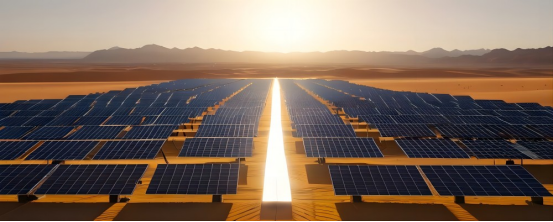
Como importante representante de la energía limpia, las células solares se utilizan ampliamente en los hogares y las industrias. Sin embargo, existen algunas diferencias entre las células solares de uso doméstico e industrial debido a sus diferentes requisitos de aplicación y condiciones ambientales en diferentes campos. Al mismo tiempo, también ha llamado mucho la atención el consumo energético de las células solares. Estas cuestiones se discutirán a continuación desde la perspectiva del uso doméstico y el uso industrial.
Diferencias entre células solares en uso doméstico e industrial
Differences in scale: Solar cell systems used in homes are usually smaller, installed on roofs or courtyards, and are mainly used to provide power for home life. Solar cell systems used in industry are larger in scale and are often used in large places such as buildings, factories or power plants for power supply, power generation or export to the grid.
Different uses: Solar battery systems used in homes are mainly used for home life, such as supplying lighting, air conditioning, heating and other electrical equipment. Industrial solar cell systems are usually used for power supply or power generation in industrial production processes, such as driving machinery and equipment, heating industrial furnaces, etc.
Technical requirements: Solar cell systems for home use have relatively low technical requirements and generally use common photovoltaic modules and simple inverters. Solar cell systems used in industry need to consider more technical requirements, such as system stability, capacity, inverter efficiency, etc.
Investment and return: Solar battery systems for home use have a small investment and a long payback period. The investment in solar cell systems for industrial use is relatively large, but due to factors such as economies of scale and favorable electricity prices, the payback period is relatively short.
In order to reduce the energy consumption of solar cells, the following measures can be taken:
Improve production process efficiency: Continuously improve the production process efficiency of solar cells and reduce energy and resource consumption.
Optimize the transportation and installation process: Optimize the transportation and installation process of solar panels to reduce transportation distance and energy consumption.
Promote intelligent maintenance: Promote intelligent solar battery system management and maintenance technology to reduce energy consumption in maintenance and management.
Promote circular economy: Promote the recycling and recycling of solar cells and reduce resource waste and energy consumption.
As a representative of clean energy, solar cells play an important role in both household and industrial fields. However, its energy consumption problem cannot be ignored. By taking effective measures, we can reduce the energy consumption of solar cells, achieve the goal of sustainable development, and contribute to building a clean and efficient energy system.
Welcome to a clean future! GEMBATTERY GzV series solar cells convert sunlight into renewable energy, helping you achieve energy self-sufficiency. Efficient conversion and long-lasting durability provide reliable power support for your home and commercial projects. No pollution, zero emissions, join us in doing our part to protect the environment. Choose GEMBATTERY GzV series solar cells, choose sustainable development, and create a green tomorrow together!
Modelos: GzV12-100, GzV12-150, GzV12-200, GzV2-200, GzV2-350, GzV2-400, GzV2-500, GzV2-1000, GzV2-1500, GzV2-2000, GzV2-3000.
Capacidad: 12V100AH, 12V150AH, 12V200AH, 2V200AH, 2V350AH, 2V400AH, 2V500AH, 2V1000AH, 2V1500AH, 2V2000AH, 2V3000AH
¡Desarrollado y potente!
Los distribuidores y empresas OEM son bienvenidos.
Conéctese con un fabricante profesional de baterías solares,
ventas@gebattery.com
WhatsApp: +8618959299560